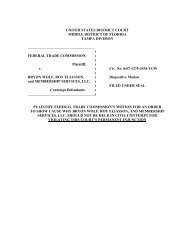Gasoline Price Changes - Federal Trade Commission
Gasoline Price Changes - Federal Trade Commission
Gasoline Price Changes - Federal Trade Commission
You also want an ePaper? Increase the reach of your titles
YUMPU automatically turns print PDFs into web optimized ePapers that Google loves.
GASOLINE PRICE CHANGES:<br />
other times, as consumers take more driving vacations. The pipeline supplying gasoline to<br />
Denver, Colorado, from the east generally was full and thus did not have the capacity to meet<br />
increased summer demand in 2001-2004. To obtain additional gasoline supplies sufficient to<br />
meet increased summer demand, Denver gas stations had to look to other, higher-cost suppliers.<br />
This effect can be seen in Denver’s wholesale price of gasoline at different times of the<br />
year. During the non-summer months in 2001-2004, Denver obtained its marginal gasoline<br />
supplies by pipeline from the east, from an area linked to the Gulf Coast. Thus, during the nonsummer<br />
months in 2001-2004, the wholesale price of gasoline in Denver reflected the wholesale<br />
spot price for gasoline on the Gulf Coast plus pipeline transportation costs. In the summers,<br />
however, the pipeline generally was full and unable to meet demand. Thus, Denver retailers had<br />
to pay wholesale gasoline prices set by a higher-cost marginal supplier. 12 Differences during the<br />
summer months averaged $0.114 per gallon between 2001 and 2004, but only $0.045 over the<br />
other months during those years. 13<br />
C. Boutique Fuel Requirements Can Affect <strong>Gasoline</strong> <strong>Price</strong>s.<br />
The final examples in this section show how boutique fuel requirements may affect<br />
gasoline prices. The first example illustrates price effects from limits on the ability to substitute<br />
conventional for boutique fuel when a supply shortage hits. The second illustrates that, with<br />
adequate planning and proper incentives, a transition between different types of fuel can be made<br />
without price spikes.<br />
1. In Detroit, the need to use environmentally mandated gasoline<br />
exacerbated gasoline price spikes due to a pipeline break in June 2000<br />
and refinery shutdowns during the blackout of August 2003.<br />
In Michigan, only the greater Detroit area (basically, southeast Michigan) uses nonconventional<br />
gasoline. In the late spring and summer, to reduce air pollution, consumers there<br />
must use gasoline with less volatility. Using less volatile gasoline reduces the gasoline<br />
evaporation rate and thus reduces the level of ozone-forming hydrocarbons released into the<br />
atmosphere. 14 The environmental requirements for summertime gasoline in the greater Detroit<br />
area mean that, when a pipeline break or refinery shutdown disrupts Detroit’s usual supplies of<br />
less volatile summertime gasoline, Detroit wholesalers cannot substitute the conventional<br />
gasoline that the rest of Michigan and many of the surrounding states use. Indeed, according to<br />
then-Attorney General, now Michigan Governor Jennifer Granholm, when the Wolverine<br />
pipeline broke in June 2000 (discussed above), the requirement for less volatile gasoline in the<br />
greater Detroit area limited wholesalers’ ability to substitute gasoline supplies from Ohio,<br />
Indiana, and Illinois, and therefore slowed the eventual decline in Detroit gasoline prices. 15<br />
In August 2003, Detroit was part of a blackout during which 50 million North Americans<br />
lost electric power. A Marathon Ashland refinery, which had been processing gasoline to meet<br />
air quality requirements in the greater Detroit area, shut down for eight days. Other refineries<br />
that supply the greater Detroit area also shut down due to the power outage. With refinery<br />
74<br />
FEDERAL TRADE COMMISSION, JUNE 2005
















